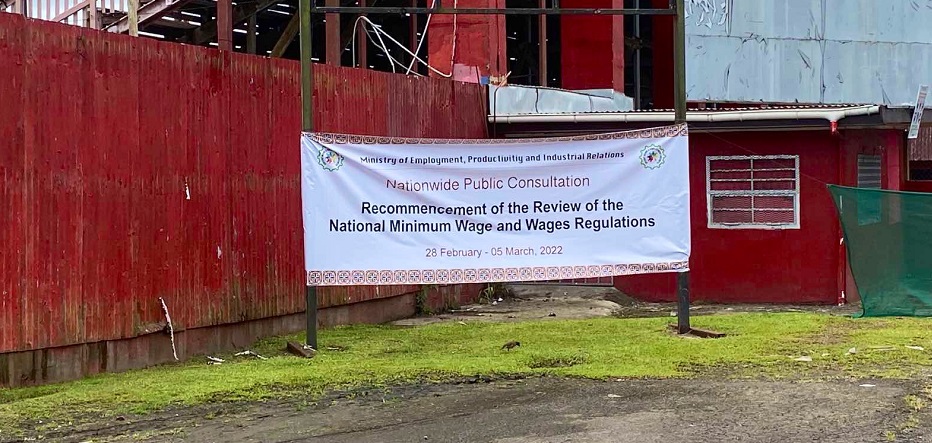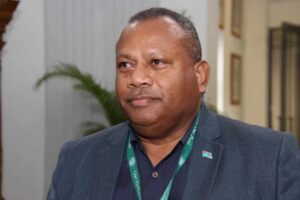There has been some push back against setting Fiji’s proposed new national minimum wage at $3.45 with some calling for it to be pegged at a lower rate despite warnings from the proposer and consultant Dr. Partha Gangopadhyay that doing so will be detrimental for nearly 200,000 Fijians living in poverty in rural communities.
Speaking via zoom to about 10 attendees in the Nausori round of public consultations held at the Ratu Cakobau Park VIP Lounge this week, Dr. Partha, who was also the consultant in charge in Fiji’s last minimum wage review in 2017 when the existing $2.68 rate was set, recommended a new minimum wage rate between $3.45 and $3.65 based on the change in the inflation rates since 2017 and the minimum wage bite between 66% and 70% of $5.25.
He also took into account the poverty situation in Fiji noting the findings of the 2019-2020 Household Income Survey where the national basic poverty line was estimated at $2,179.39 per adult equivalent (AE) per year or $41.91 per AE per week.
“Based on the consumption expenditure, the incidence of poverty in Fiji is 29.9%. Like all other developing nations, 62.2% of the poor live in rural areas. About 176,000 Fijian rural people fail to rise above the BPNL income of $41.91 AE in 2019-2020.”
This, Dr Partha says underscores the importance of increasing the minimum wage adding that revising the rate now will protect the vulnerable workers and their families from the economic and financial disruptions from the COVID-19 pandemic against the backdrop of the Ukraine crisis.
A stance backed by some attendees at the Nausori consultations but who were also of the view that the new rate should be sustainable as well for the employers, recommending that it be set between $3.20 and $3.25.

Nausori Chamber of Commerce executive member Ishad Ali said the pay rise should be reasonable for both the employers and employees.
“At the end of the day, anything the employer pays it will be passed on to the consumers, so you have to rationalise it. Nausori Chamber of Commerce recommends between $3.20 and $3.25, we support the minimum pay rise, but because of the pandemic, the war, won’t be reversed. If things improve, the minimum wage will stay.
“The pandemic came into the equation, and the war which is only one week old… in time to come it will go down and prices will get better. I have got a retail sales outlet as well and I understand, it’s going to be passed onto the consumers. If we give them a pay rise, it’s going to one pocket, and you taking out from the other pocket.”
Club Secretary Nausori Club and former administrator Nausori and Nasinu town council Umakant Patel also picked $3.25 as feasible, adding that paying a higher rate may be disadvantageous for employees.
“Definitely the wage increase is required. Let’s drive the economy. We have been hit hard over the last two years by the pandemic, and of course, with this war between Ukraine and Russia, it won’t help much anyway and the inflation would further go up, and if these people if not paid now with the increase in the minimum wage, will be further hit hard. So getting the wages, and a better pay packet basically means a better investment. This money will flow back into the economy, the business people will gain back that money. The standard of living would go up, govt will gain through increased tax and we have a sound and happier living environment for these 176,000 people.
“My only concern was that we do not want to see an environment where we see the increase in this minimum wage, the employees are victimised by the employers. We don’t want a situation where because of the increase, they cut down [on] their staff or reduce working hours, or start doing shift work.
“It should be simultaneously controlled by the Ministry of Labour, Consumer Council, the Fair Trading Act, they all should be working hand in hand when this new minimum wage comes into effect so, everybody has a fair living. Definitely, there needs to be an increase.”
Dr Partha maintained that the review of the national minimum wage was long overdue. He said the wage margin would have been minimal if the NMW was changed regularly if not every two years then whenever inflation increases.
The decision as to what the new minimum wage should be, Dr Patha says lies with the people of Fiji who when setting the new wage rate should ask themselves if the rate is “fair to the vulnerable people.”
Public consultations continue today in Navua and Sigatoka, finishing on Saturday in Suva.
Written submissions are also being accepted by the Ministry of Employment provided it is submitted before 4pm Monday 7 March. The Fijian Government hopes to complete the review before it announces its mini-budget on Thursday 24 March. The budget announcement is scheduled for 7.30 pm. The debate on the budget and approval will take place the following day on Friday 25 March.









